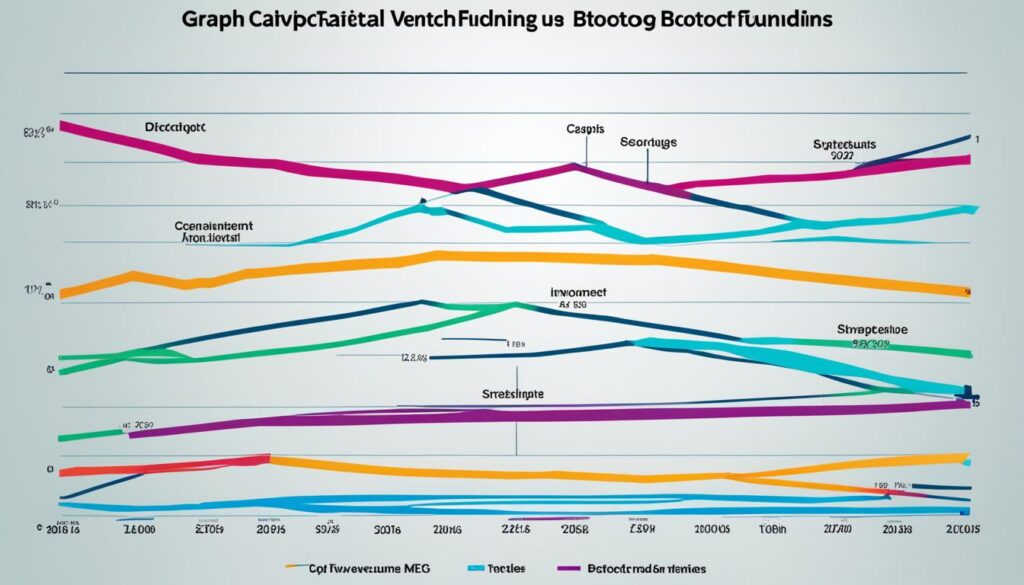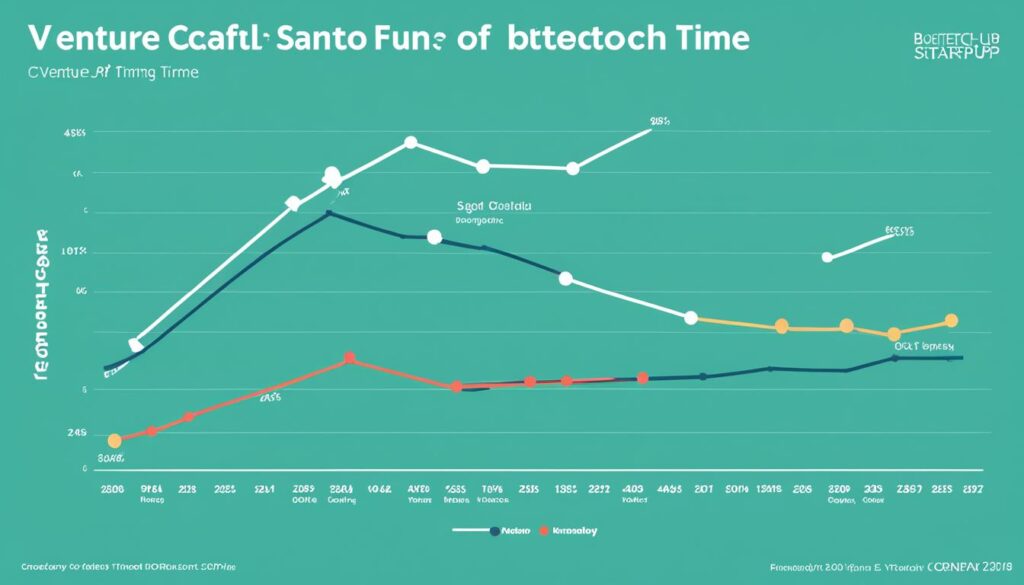As an avid observer of the life sciences industry, I can’t help but wonder: what are the latest trends driving venture capital funding for biotech startups? The biotech sector has long been a magnet for investors seeking to capitalize on the immense potential of cutting-edge technologies and therapies, and the landscape is constantly evolving. In this article, I’ll delve into the latest developments shaping the world of biotech venture capital, from the surge in investment for gene editing and cell therapies to the emergence of new biotech hubs and the strategies employed by venture capitalists in this dynamic industry.
Key Takeaways
- Venture capitalists are increasingly drawn to biotech startups working on transformative technologies like gene editing and cell therapies.
- The biotech venture capital industry has experienced exponential growth, with record-breaking funding rounds for promising startups.
- Emerging biotech hubs, such as San Diego and Seattle, are challenging the traditional dominance of Boston and San Francisco.
- Venture capitalists employ diverse strategies, from early-stage investments to late-stage acquisitions, with a focus on specific therapeutic areas or technologies.
- The COVID-19 pandemic has had a significant impact on the biotech industry, both in terms of increased demand and operational challenges.
What are the latest trends in venture capital funding for biotech startups?
The biotech industry has captivated venture capitalists, who have been increasingly drawn to startups pioneering cutting-edge technologies. One such area that has garnered significant investor interest is gene editing, particularly the revolutionary CRISPR gene-editing tool. These powerful techniques hold immense potential for treating genetic disorders and developing innovative therapies to address unmet medical needs.
Alongside the surge in gene editing investments, venture capitalists have also displayed growing enthusiasm for cell and gene therapies. These transformative treatments offer new hope for patients with previously untreatable conditions, making them a prime focus for VC funding. As the field of cell and gene therapies continues to evolve, the influx of capital from venture capitalists is fueling the development of groundbreaking solutions.
Personalized medicine and precision diagnostics have also captured the attention of venture capitalists, who recognize the value of these technologies in enabling more targeted and effective healthcare solutions. The ability to tailor treatments to an individual’s genetic profile or to detect diseases with greater accuracy has attracted significant VC funding, as biotech startups work to revolutionize the way we approach healthcare.
| Trend | Key Drivers | Potential Impact |
|---|---|---|
| Increasing investment in gene editing and CRISPR technologies | – Groundbreaking potential for treating genetic disorders – Ability to develop innovative therapies |
– Accelerated advancements in genetic medicine – Improved patient outcomes for a range of genetic conditions |
| Growing interest in cell and gene therapies | – Offering new hope for previously untreatable conditions – Transformative potential in healthcare |
– Expansion of treatment options for patients – Breakthroughs in addressing unmet medical needs |
| Rising demand for personalized medicine and precision diagnostics | – Enabling more targeted and effective healthcare solutions – Improving disease detection and management |
– Personalized treatment approaches – Enhanced patient outcomes through early intervention |

Biotech Venture Capital: A Booming Industry
The biotech venture capital industry has been experiencing a remarkable period of growth and success. We’ve seen a steady stream of record-breaking funding rounds for promising biotech startups, with investors pouring billions of dollars into the most innovative and transformative biotechnology investment and startup financing opportunities.
Record-breaking Funding Rounds for Promising Biotech Startups
The VC funding trends in the life sciences investment sector have been nothing short of impressive. Biotech startups working on cutting-edge technologies and therapies have consistently secured staggering amounts of venture capital, as investors recognize the immense potential of these biotech venture capital-backed companies to revolutionize healthcare and improve patient outcomes.
Exponential Growth in Biotech Investment Over the Past Decade
Over the past decade, investment in the biotech fundraising and life sciences investment space has grown exponentially. This surge in biotech venture capital has been driven by the industry’s ability to deliver transformative solutions, from groundbreaking gene editing and cell therapies to personalized medicine and precision diagnostics. As the demand for innovative biotechnology continues to rise, venture capitalists have increasingly prioritized this dynamic and rapidly evolving sector.

Emerging Biotech Hubs and Hotspots
While the traditional biotech powerhouses of Boston and San Francisco continue to dominate the landscape, new biotech clusters are emerging in cities like San Diego and Seattle. These up-and-coming biotech hubs are attracting significant VC funding and becoming magnets for talented researchers, entrepreneurs, and investors. The concentration of biotech expertise, infrastructure, and access to capital in these regions is fostering the growth of innovative startups and driving the industry’s progress.
The rise of Boston and San Francisco as biotech powerhouses
Boston and San Francisco have long been biotech hotspots, with their well-established research institutions, thriving startup ecosystems, and abundance of venture capital. These two cities have cemented their positions as global leaders in the biotech industry, attracting top talent and commanding a significant share of investment dollars.
Emerging biotech clusters in cities like San Diego and Seattle
Alongside the dominance of Boston and San Francisco, new biotech hubs are emerging in other regions of the United States. Cities like San Diego and Seattle have been rapidly developing their own biotech ecosystems, leveraging their strengths in areas such as life sciences research, technology innovation, and access to talent. These up-and-coming biotech hotspots are drawing increasing attention from venture capitalists and becoming magnets for the next generation of biotech startups.

Venture Capitalists’ Strategies and Focus Areas
In the biotech venture capital landscape, investors employ a diverse range of strategies to identify the most promising investment opportunities. While some venture capitalists (VCs) focus on funding early-stage startups with cutting-edge technologies or groundbreaking therapies, others prefer to invest in more mature, late-stage companies with a proven track record.
Early-stage versus Late-stage Investment Preferences
Early-stage biotech startups often capture the attention of venture capitalists seeking to capitalize on innovative ideas and disruptive technologies. These VCs are willing to take on higher risks in exchange for the potential of substantial returns, should the startups they invest in successfully navigate the lengthy and complex drug development process. On the other hand, late-stage biotech companies, which have already demonstrated the feasibility and efficacy of their products, appeal to VCs who prioritize lower-risk investments with more predictable outcomes.
Specialization in Specific Therapeutic Areas or Technologies
Many venture capitalists in the biotech sector have also adopted a more specialized approach, focusing their investments on specific therapeutic areas or technologies. For instance, some VCs may specialize in oncology or rare diseases, while others concentrate on gene editing, cell therapies, or artificial intelligence-powered drug discovery. This strategic focus allows them to develop a deeper understanding of the industry landscape and identify the most compelling investment opportunities within their areas of expertise.
By employing a range of investment strategies and leveraging their specialized knowledge, venture capitalists in the biotech industry are better positioned to navigate the dynamic and highly competitive landscape, supporting the most promising startups and driving innovation that can transform the future of healthcare.

Challenges and Risks in Biotech Investing
Investing in the biotech investment challenges sector is not without its hurdles and biotech investment risks. The lengthy, complex, and highly regulated nature of drug development, the high failure rates in clinical trials, and the substantial capital requirements can all pose significant obstacles for biotech startups seeking venture capital funding.
Venture capitalists must carefully navigate these challenges and ensure that their investment portfolio is diversified to mitigate the inherent risks in this dynamic and rapidly evolving industry. The long and arduous drug approval process, the unpredictability of clinical trial outcomes, and the significant upfront costs required to bring a new therapy or technology to market can all test the patience and resilience of investors.
| Biotech Investment Challenges | Biotech Investment Risks |
|---|---|
| Regulatory Complexities | High Failure Rates in Clinical Trials |
| Lengthy Development Timelines | Substantial Capital Requirements |
| Technological Uncertainties | Competitive Landscape Dynamics |
| Market Access Hurdles | Intellectual Property Risks |
Despite these challenges, the promise of transformative breakthroughs in healthcare and the potential for significant returns continue to draw venture capitalists to the biotech sector. Successful investors in this space must possess a deep understanding of the industry, a keen eye for promising technologies and teams, and a willingness to navigate the inherent risks that come with investing in the fast-paced world of biotechnology.

Regulatory and Clinical Trial Hurdles
As biotech startups navigate the complex and ever-evolving landscape of biotech regulatory challenges, they face a daunting task of adhering to the strict guidelines and approval processes set forth by the U.S. Food and Drug Administration (FDA) and other governing bodies. This regulatory environment requires significant expertise and resources, posing a formidable hurdle for many promising startups.
In addition to the biotech clinical trials and FDA regulations that must be meticulously navigated, venture capitalists must also consider the high failure rates associated with clinical trials. Despite the immense potential of many biotech therapies, the clinical trial risks posed by factors such as ineffectiveness or safety concerns can ultimately derail promising projects, presenting a significant challenge for investors.
As venture capitalists evaluate potential biotech investments, they must carefully assess the regulatory landscape and clinical trial obstacles facing each startup. By understanding these challenges and developing strategies to mitigate the associated risks, they can make more informed decisions and support the most promising innovations in the life sciences sector.

Biotech Startup Valuations and Exit Strategies
Determining the valuation of biotech startups can be a complex process, with factors such as the company’s technology, the stage of biotech funding rounds, the competitive landscape, and the potential market size all playing a role. Successful biotech startups often command significant funding rounds as venture capitalists bet on their ability to develop transformative therapies or technologies.
When it comes to exit strategies for biotech startups, entrepreneurs and investors typically pursue options like initial public offerings (IPOs) or acquisitions by larger pharmaceutical or biotechnology companies. These biotech IPOs and biotech acquisitions can provide substantial returns for early-stage investors and fuel the continued growth and innovation in the life sciences industry.
| Factors Influencing Biotech Startup Valuations | Common Biotech Exit Strategies |
|---|---|
|
|

Impact of COVID-19 on Biotech Funding
The COVID-19 pandemic has had a profound impact on the biotech industry, both in terms of increased demand for vaccine and therapeutic development, as well as the various disruptions and challenges faced by biotech startups. Venture capitalists have poured significant funding into companies working on COVID-19 solutions, recognizing the urgent need and the potential for substantial returns.
Increased demand for vaccine and therapeutic development
The global race to develop effective vaccines and treatments for COVID-19 has led to a surge in investment in biotech companies focused on this critical endeavor. Venture capitalists have eagerly backed startups with promising vaccine and therapeutic candidates, fueling their rapid progress through clinical trials and regulatory approval processes. This heightened demand for COVID-19 solutions has provided a significant boost to the biotech industry, showcasing the sector’s pivotal role in addressing public health emergencies.
Disruptions and challenges faced by biotech startups
However, the COVID-19 pandemic has also caused significant disruptions and challenges for many biotech startups. Supply chain disruptions, delays in clinical trials, and other operational difficulties have forced these companies to navigate unprecedented circumstances. Biotech entrepreneurs have had to adapt quickly, finding new ways to maintain progress and continue their essential work. Despite these obstacles, the resilience and innovative spirit of the biotech community have shone through, as startups strive to overcome the hurdles posed by the pandemic.

Future Outlook and Predictions
As I look ahead, I see a bright future for the biotech industry, with a range of exciting future biotech trends and emerging biotech technologies poised to shape the landscape. From advancements in gene editing, cell and gene therapies, and personalized medicine to the increasing adoption of artificial intelligence and machine learning in drug discovery and development, the biotech sector is on the cusp of transformative breakthroughs.
Emerging Technologies and Trends Shaping the Biotech Landscape
The future of the biotech industry is being driven by innovative technologies that are revolutionizing the way we approach healthcare. Cutting-edge advancements in gene editing, using tools like CRISPR, are opening up new possibilities for treating genetic disorders and developing innovative therapies. Additionally, the rapid progress in cell and gene therapies is offering hope for patients with previously untreatable conditions.
Personalized medicine and precision diagnostics are also gaining significant traction, as these technologies enable more targeted and effective healthcare solutions tailored to individual patient needs. The integration of AI in biotech and machine learning in biotech is further accelerating the pace of innovation, transforming drug discovery and development processes.
The Role of Artificial Intelligence and Machine Learning in Biotech
The application of artificial intelligence and machine learning is poised to play a transformative role in the biotech industry. These advanced technologies are already being leveraged to streamline drug discovery, accelerate clinical trials, and optimize various aspects of the drug development pipeline. By harnessing the power of AI and machine learning, biotech startups and established companies can unlock new insights, identify promising drug candidates, and expedite the path to market for life-saving treatments.
Venture capitalists will continue to play a crucial role in funding and supporting the most promising biotech startups, driving innovation and improving patient outcomes. With their strategic investments, the biotech sector is well-positioned to deliver breakthroughs that will positively impact the lives of individuals and communities around the world.

Conclusion
In conclusion, the trends in venture capital funding for biotech startups reflect the immense potential and dynamism of the life sciences industry. From the surge in investment in cutting-edge technologies like gene editing and cell therapies to the booming biotech venture capital landscape, the sector is poised for continued growth and innovation. As biotech hubs emerge in cities like Boston, San Francisco, San Diego, and Seattle, venture capitalists refine their investment strategies and focus on specialized therapeutic areas or technologies.
Despite the challenges and risks inherent in the biotechnology investment space, such as navigating the complex regulatory environment and mitigating the high failure rates in clinical trials, the future looks bright for the biotech industry and the patients it serves. The increasing demand for personalized medicine, precision diagnostics, and innovative therapies, coupled with the role of artificial intelligence and machine learning in drug discovery, are just a few of the factors that will drive startup financing and VC funding trends in the years to come.
As I look ahead, I am excited to witness the continued evolution and breakthroughs in the life sciences investment sector, as emerging biotech companies push the boundaries of what’s possible and venture capitalists play a crucial role in supporting and funding the most promising innovations. The future of healthcare is being shaped by the dynamic and transformative landscape of biotech venture capital.
